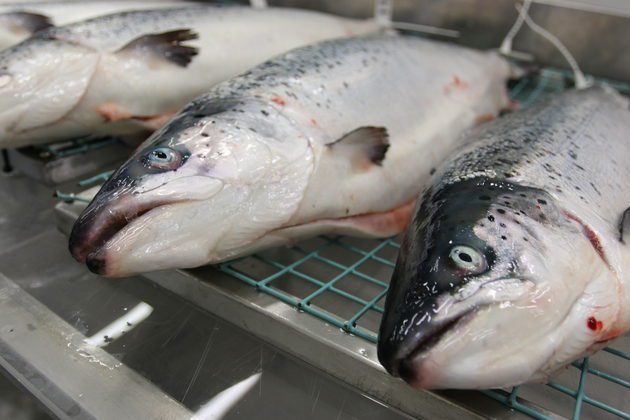
A recent study by scientists from NOFIMA and Epax Norway with Atlantic salmon juveniles reveals the promising potential of these very-long-chain polyunsaturated fatty acids (VLC-PUFA n-3) to promote skin health, in fish and, potentially, in humans.
Knowledge about the health consequences of a lack of very-long-chain marine fatty acids, called VLC-PUFA, is relatively new. It is known that a lack of these fatty acids can lead to infertility and the eye disease called Stargardt’s disease.
Study findings
The researchers investigated the effects of different dietary levels of VLC-PUFA n-3 on salmon skin development. Compared to their counterparts on a standard diet, salmon fed with higher levels of these special fats showed some notable changes:
- Thicker epidermis: The outermost layer of their skin, the epidermis, became thicker and stronger, suggesting better protection against external threats.
- Faster scale maturation: Their scales, which act as armor, matured more quickly, potentially improving overall skin barrier function.
- Improved migration: In laboratory experiments, skin cells isolated from salmon fed with VLC-PUFA n-3 showed improved migration, a crucial factor in wound healing.
Strengthens skin
“This is the first time we have investigated the bioavailability of VLC-PUFA, that is, whether the body can use the fatty acids when they are ingested through the diet or from dietary supplements. We have conducted intervention studies in rats, mice, and salmon. They have received different concentrations of these very-long-chain marine fatty acids, but all are at levels higher than those found in fish oil. We see a linear effect: the higher the concentration in the diet, the more it is absorbed into the different tissues,” says senior scientist at Nofima, Bente Ruyter, who was the main supervisor of the doctoral student Martina Torrissen, who conducted the trials.
Scientists have seen that VLC-PUFA fatty acids are absorbed into all types of tissues, especially the skin and testicles. Therefore, the next step was to take a closer look at these tissues in particular.
“We have continued with the intervention studies in salmon, and in them we see that VLC-PUFA generates new skin faster and further contributes to increasing the thickness and maturation of salmon skin, providing protection against infections and injuries inflicted mechanically,” says Martina Torrissen.
Strengthens bones
“In intervention studies with salmon, we see that VLC-PUFA improves spine mineralization and increases bone density. Existing human cell models are also used here. Cellular studies suggest that VLC-PUFA contributes to faster specialization and mineralization of bone cells. Therefore, the results indicate that these fatty acids can help to heal bone fractures,” Martina Torrissen states.
VLC-PUFA – new omega-3 product from marine oils
There are few VLC-PUFA in fish oil, only half a percent or even less. Therefore, it is important to have the technology and expertise to be able to separate these unique fatty acids from the other fatty acids in marine oils.
Martina Torrissen is an industrial PhD student at the company Epax Norway AS. Epax develops and produces, among other things, ingredients for pure omega-3 concentrates based on marine oils. They are now in the process of developing ingredients for dietary supplements based on VLC-PUFA.
Stay Always Informed
Join our communities to instantly receive the most important news, reports, and analysis from the aquaculture industry.
“We are proud to have discovered that there is a small amount of these unique VLC fatty acids in fish oil and to have found a way to extract them as a complement to the most common omega-3 concentrates. The research of this doctorate and Nofima is very important as it documents absorption into important organs and the positive health effects,” says Bjørn Refsum, CEO of Epax.
Key benefits in salmon aquaculture
These findings point to potentially beneficial effects of VLC-PUFA n-3 for the overall health of farmed salmon:
- Improved protection: A thicker epidermis and faster scale maturation could offer better defense against environmental damage, infections, and parasites.
- Faster wound healing: Improved cell migration could lead to faster and more efficient wound repair, reducing the risk of scarring and infections.
- Overall skin health: The combined effects suggest that VLC-PUFA n-3 could contribute to a stronger and healthier skin barrier, with implications for both fish and potentially humans.
Conclusion
Scientists conclude that VLC-PUFA is absorbed from the diet into Atlantic salmon skin tissue, with positive effects on skin development and maturation.
The scientists also highlight that “the results suggest that VLC-PUFA may have beneficial effects on the development, function, and integrity of skin tissue, which could be important for skin health.”
Although more research is needed to confirm these findings in humans, the study opens up interesting possibilities for incorporating VLC-PUFA n-3 into skincare routines or dietary supplements.
Contacts
Bente Ruyter
Senior Scientist
+47 64 97 04 74
Elisabeth Ytteborg
Senior Scientist
+47 64 97 04 50
Astrid Nilsson
Senior Scientist
+47 64 97 03 06
Reference (open access)
Torrissen M, Ytteborg E, Svensen H, et al. Investigation of the functions of n-3 very-long-chain PUFAs in skin using in vivo Atlantic salmon and in vitro human and fish skin models. British Journal of Nutrition. 2023;130(11):1915-1931. doi:10.1017/S0007114523001150
Note: The article was prepared with information from the press release and the study.
Editor at the digital magazine AquaHoy. He holds a degree in Aquaculture Biology from the National University of Santa (UNS) and a Master’s degree in Science and Innovation Management from the Polytechnic University of Valencia, with postgraduate diplomas in Business Innovation and Innovation Management. He possesses extensive experience in the aquaculture and fisheries sector, having led the Fisheries Innovation Unit of the National Program for Innovation in Fisheries and Aquaculture (PNIPA). He has served as a senior consultant in technology watch, an innovation project formulator and advisor, and a lecturer at UNS. He is a member of the Peruvian College of Biologists and was recognized by the World Aquaculture Society (WAS) in 2016 for his contribution to aquaculture.







